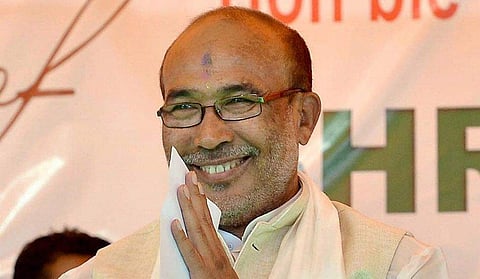

On all counts, Nongthombam Biren Singh was a good footballer. But destiny, charted by uncertainties in his home state Manipur, chose a different goal for him to score. From being a member of the BSF team that lifted the Durand Cup in 1981 by defeating the famed Mohun Bagan, to the Chief Minister’s chair, Singh has dodged and decimated his opponents in the political arena.
However, from where he stands, it would appear he is losing the game of perception or has been made to accept a defeat that he would perhaps never own up to. Sportspersons of some nerve seldom accept a tame surrender. Will he, that’s the question that he seems to be grappling with.
Since May 3 this year, more than 100 people have died and some 50,000 displaced internally, after ethnic violence buffeted Manipur. His political opponents often call him autocratic and petulant. Singh sits tight in his chair, unable to do more than issue vain appeals for peace even as ethnic violence refuses to abate. His removal would have sent a wrong message in Manipur and the Northeast, which accounts for 25 Lok Sabha seats.
Singh, 62, was born and raised in a Hindu family at Luwansangbam Mamang Leikai in Imphal. The football bug bit him early and he joined a local club. A year after the Durand Cup victory, Singh left BSF but kept playing for Manipur. Came in 1992, and Singh drifted to journalism. He launched ‘Naharolgi Thoudang’, initially a magazine. He served as its editor till 2001. A year after, he was jailed for sedition, when Daily carried the speech of an activist who was allegedly close to a separatist outfit.
It was an irony that Singh, who was slapped with the sedition charge, had Imphal-based journalist Kishorechandra Wangkhem arrested almost two decades later (in 2021) for calling his BJP-led government a puppet of the Modi government. Singh took the political plunge in 2002 by joining the Democratic Revolutionary People’s Party. He won his first election from the Heingang seat that year.
In 2003, he moved to Congress and the then chief minister Okram Ibobi Singh appointed him as a minister. He won the subsequent elections in 2007 and 2012 and served as a minister. Ibobi was his virtual political guru, but the two started falling apart in 2015 with Singh increasingly finding himself cornered in the party. He quit and wore saffron in 2016.
Singh was appointed the spokesperson and co-convener of the state BJP unit’s election management committee. He won the Heingang seat in 2017 and the BJP, which formed a coalition, sprang a surprise and chose him as the CM.
Singh earned popularity during the first two years of his first term (2017-2022). There was a huge divide between the Meitei-majority Imphal Valley and the Naga hills, ostensibly because of the Nagas’ demand for the creation of “Greater Nagalim” by slicing off the Naga-inhabited areas of Manipur besides Assam and Arunachal Pradesh. He sought to reduce the gap and launched some initiatives to warm up to the tribals, particularly Nagas.
The trouble for him started in 2020 when he allegedly started forgetting about “coalition dharma”. Nine MLAs – three from BJP, one from Trinamool Congress, four from the National People’s Party (NPP) and an independent MLA – resigned and announced their support to Congress.
They returned about a fortnight later after a patch-up worked out by BJP leaders. The mass resignations had reduced the BJP-led government to a minority and the Congress tried to form a coalition government. Had the BJP not been in power at the Centre, Singh’s government would have collapsed.
His second term was perceived to be diametrically opposite to his “go to hills” initiative in the first. He launched a drive against drugs and poppy cultivation, with a drive against “illegal immigrants” from Myanmar, usually meaning people from the Kuki-Chin-Zomi tribes. This snowballed into a battle between Kukis and Meiteis.
Singh is facing charges of pushing an anti-tribal agenda and polarising communities. His allies and rivals have slammed his “inept” in handling of conflict. Singh has to decide, whether to stay on as long as it takes or exit in a bargain of sorts for a bigger role in the parliamentary polls.